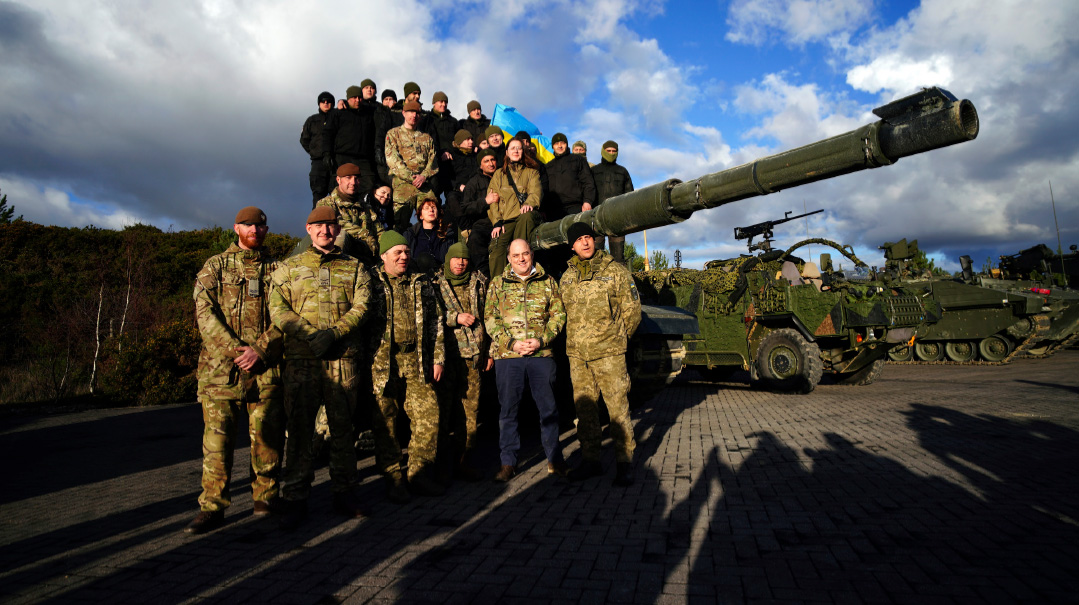First Skirmish in New Cold War?

When the US and the EU provide Ukraine with massive aid while Iran — and potentially China — back Russia, the question arises: Is this the Cold War 2.0?

Photo: AP Images
IT
seems that the war in Ukraine has exhausted its news value. One could even say that a certain indifference has developed across the world toward a conflict that has already claimed 300,000 lives and continues to rage in the heart of Eastern Europe, well into 2023.
But even so, the one-year anniversary of the war’s outbreak is worth dwelling on. A year ago, Western public opinion would have rated Ukraine’s chances poorly, giving it no more than a few days or weeks at the most. No one would have predicted that a year later, Ukraine would not only be hanging in against the Russian giant but even landing some punches.
Biden took a gamble with massive supply airlifts that enabled the Ukrainians to stabilize the situation and ultimately repel the Russian advance. This week, Biden landed in Kyiv in what was seen as a major humiliation for Vladimir Putin.
Volodymyr Zelensky managed to take the world by surprise, morphing overnight from an inexperienced politician best known as a comic actor to a leader coordinating military aid with Ukraine’s allies across the world, especially the US, and succeeding in upgrading his army’s capabilities on the move. The Ukrainian army is much more sophisticated than it was a year ago.
By contrast, we’re seeing massive Iranian support for Russia in the form of combat drones, reportedly in exchange for Russian warplanes. Speculation has also arisen regarding possible aid from China, although on the eve of the war’s first anniversary, Beijing was launching a peace initiative to try to bring the fighting to an end.
When we see the United States and the EU providing Ukraine with massive aid while Iran — and potentially China — back Russia, the question arises: Is this the Cold War 2.0?
The University of Florida’s Professor Ido Oren, who specializes in international security and US foreign policy, is hesitant about applying the Cold War label, but he predicts this conflict will be around for a while.
“The Ukrainians are optimistic that they can roll back Russian forces in the East and possibly even go all the way to Crimea,” says Oren. “As long as they think they can make military gains and tht US aid will continue, they’ll fight on. On the Russian side, it’s basically down to one man, Putin, and my sense is that he’s not ready to settle at this point.”
Oren says that NATO has been “rejuvenated” by the crisis, as seen in the desire of both Finland and Sweden to join the alliance, and in key member Germany’s willingness to ratchet up its defense spending. But ironically, the US role in the conflict is facing questions from Republicans in Congress as to the desirability of aid to Ukraine.
“I think the problem is less with the capability of the United States and the Europeans to support Ukraine and more with the domestic politics of the matter,” Oren says.
But Michigan State University’s Professor Matthew Zierler is more optimistic that the GOP will continue to back Ukraine. “We hear about the Republican lack of support for US aid in Ukraine, but it’s really from a small but loud minority,” he says. “The average Republican will still support [Ukraine] because we realize the importance of Russia. It’s a quirk of political history that the Republican Party under Trump sidled up as much as it did to Vladimir Putin. Most mainstream Republicans, like most mainstream Democrats, see Russia as at least a nuisance, if not a threat.”
Zierler also sees Europe staying united against Moscow, as evidenced by the EU’s recent deal with Azerbaijan to replace Russia as an energy supplier. For Zierler, the more interesting question is how stable the Russia-Iran-China axis is.
“It’s worth looking at,” he says. “Iran is as isolated as it is. You see them searching for an outlet. Given their own domestic troubles, though, I’m not sure how much their support will really help in the end.”
China, he says, is not as desperate as Iran is, and is keeping its focus on the long game. As such, Beijing will likely avoid getting “bogged down” in a prolonged Russia-Ukraine conflict, but it will leverage the situation to whatever benefit it can.
“China, however, is a very strategic and self-interested actor,” Zierler says. “This is part of China’s strategy what we see around the world — to make sure that China has others loyal to it. So if China can help out the Russians, at least for a little bit, that would put Russia in China’s debt. That’s China’s geopolitical strategy, to have others feel the need to rely on it as China becomes a regional power.”
The key, Zierler says, will be how well Ukraine’s military bears up against the Russian onslaught. “Most observers thought the Ukrainians couldn’t keep up with the Russian military. And we’ve seen just the opposite. So the longer this goes on, the worse it is going to be for Russia. And I can’t see countries like Iran and China staying in the long haul if it’s clear that Russia is not going to win.” —
(Originally featured in Mishpacha, Issue 951)
Oops! We could not locate your form.







